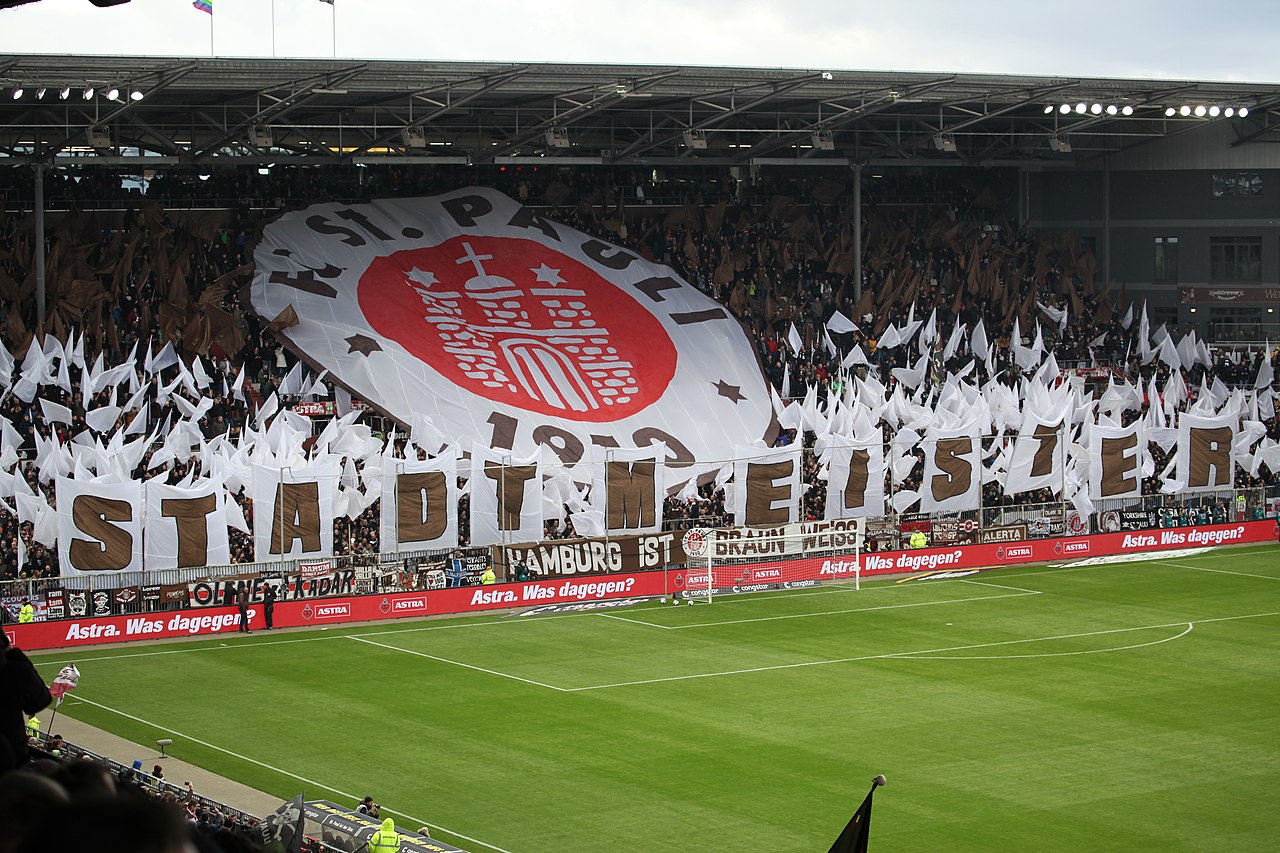2. Bundesliga: why FC St. Pauli is the world’s second team
Hamburg, Germany’s second city, accommodates two entirely contrasting football clubs. To the north, Hamburg SV occupy the 57,000-seat capacity Volksparkstadion. To the south, by the banks of the River Elbe in the centre of Hamburg, FC St. Pauli call the smaller, less glamourous Millerntor-Stadion their home.
Hamburg, until as recently as 2019, were a mainstay in the Bundesliga. The club had become such an integral part of the furniture in the German top flight that a clock was installed in the northwest corner of the Volksparkstadion to celebrate Hamburg’s continuous membership of the Bundesliga since the competition was formed in 1963.
By contrast, St. Pauli has appeared in the Bundesliga just twice since 2000, and were relegated at the first time of asking on both occasions. St. Pauli has failed to win a single top-level title in the club’s 109-year history. Die Kiezkicker have finished runners-up in the 2. Bundesliga on three occasions, and last lifting silverware in 2007, by winning the Regionalliga Nord title.
St. Pauli’s charm transcends the numerous sports that the club participates in
Simply put, St. Pauli is a club with an exceptionally mediocre history, especially when placed in direct comparison with their one-time European Cup-winning rivals. Regardless, St. Pauli is a club that attracts astonishing support from football fans around the world, a loyal fanbase that will undoubtedly resurface in a weeks’ time once the 2. Bundesliga returns.
On the surface level, it is puzzling how a club that has been defined by its lack of success on the pitch is so popular away from it. St. Pauli’s charm, however, transcends the numerous sports that the club participates in.
The club is known for its distinctive social culture away from the field, in which St. Pauli’s supporters have become increasingly associated with progressive politics. The club’s transition to becoming a “Kult” club began in the mid-1980s, after it began to take advantage of its location near Hamburg’s famous Reeperbhan – the centre of the city’s nightlife and red-light district.
The Buccaneers’ lack of footballing heritage appears to be a damning indictment
An alternative fan scene emerged; a trend that only grew stronger after the club became the first in Germany to ban right-wing nationalist activities from its stadium in an era when hooliganism threatened the sport’s existence. In the late 1990s, St. Pauli came to be recognised for its activism, attracting attention from around the world for its support of the LGBTQ+ community.
In New York City, an official supporters group formed in celebration of the club’s culture. The East Side Pirates, as the supporters’ group is known, “watch FCSP matches tape-delayed in convivial camaraderie, while upholding the proud St. Pauli tradition of standing firmly against racism, sexism, homophobia, and fascism.”
In 2006, a piece in the Washington Post described St. Pauli as “soccer’s coolest club”, quite the accolade for a club divinely uncool on the pitch. Of course, from a distance, the Buccaneers’ lack of footballing heritage appears to be a damning indictment upon the football club’s credentials.
The decision enraged management in Munich to such an extent that Bayern was granted an injunction
Those cheering for the brown half of Hamburg, however, don’t seem to mind. When St. Pauli hosted Bayern Munich in 1989, the club’s official match programme was entitled “Class War”. The decision enraged management in Munich to such an extent that Bayern was granted an injunction to stop the programme from going on general sale.
Domestically, St. Pauli isn’t regarded as the nation’s “coolest” team, far from it. In recent years, ultras across German football have accused St. Pauli supporters of being one of only two fanbases that actively choose to support their club. The charge made by rival supporters is that people choose to follow St. Pauli because the club has become a self-styled fashion statement. St. Pauli’s credentials as the club of choice for global hipsters has – in the eyes of many domestic onlookers – plasticised what the Buccaneers claim to stand for.
St. Pauli’s status as the world’s second team is therefore more complex than it first seems. On the one hand, St. Pauli is a club that has been praised for decades for its progressive advocacy. On the other, dissenting voices claim that the Hamburg club has become a parody of what it once was. Regardless, St. Pauli retains its charm as a globally recognised underdog, one that claims to fight the good fight.
Tucked away by the River Elbe, St. Pauli is a different kind of club. If you’re looking to follow a team that wins, continue on your search. Regardless of their failure to deliver on the pitch, St. Pauli is, however, the port of call for thousands of supporters around the world. The 2. Bundesliga returns next week, perhaps St. Pauli is the team for you, too.

Comments